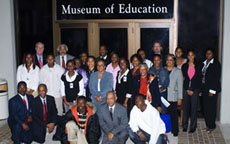

My autumn 2008 visit to Natchitoches was a delight and I have many fond feelings and delightful memories of those teachers and alumni who so kindly responded to my invitation to come together and discuss the significance of their high school. I knew my research experiences would be quite wonderful after meeting the first interviewee, teacher and alumnus Pearl H. Payne, who arrived early and entranced me with her enthusiasm and good cheer. |
|||||||||||||
 participants Arthur Welch, Pearline Baptiste, and Lusetta Anthony |
|||||||||||||
I so appreciated the thoughtfulness and genuine pride and delight that came forth during our conversations. I learned much and laughed much as everyone displayed the love and sense of community that clearly was a hallmark of the Natchitoches Parish Training School. I remember the radio interview where I was joined by Arthur Welch who so beautifully described the school (and inspired Sylvia M. Morrow to take part in this research project). Of course I was charmed by the city of Natchitoches, and I thank Ed Ward and Alma Johnson for introducing me to one of the more unique and delicious cuisines of any of the research sites that I visited. I will never forget LeRoy Wafter’s cane, and I so appreciate Geneva Barrow’s kindness. I will never forget witnessing the love and affection that so many of the participants expressed about this remarkable school. |
 with Ms. Morrow and Mrs. Presley |
||||||||||||
 participants Geneva B. Barrow, Reverend J. D. Dupree, Grace T. Baptiste, Alma Loftin Johnson, and LeRoy Wafter |
|||||||||||||
I so greatly appreciate the efforts of Alma Loftin Johnson who has continued to work with me on this web exhibition. I could not have undertaken this research project without her help and, for that, I am forever thankful.
|
|||||||||||||
 Craig Kridel with Mrs. Johnson |
|||||||||||||
I hope this web exhibition will cause patrons to reconsider the important-yet-overlooked heritage of African American secondary school education prior to the Briggs v Elliot case, to acknowledge the true injustices of a “separate and allegedly equal” educational system, to appreciate the importance of preserving the memory of these courageous schools that forged strong educational programs within segregated communities, and to recognize a spirit of progressive education that embraced “democracy as a way of life” in a struggle for civil rights and social justice. Craig Kridel |
|||||||||||||

an institutional member of the International Coalition of Sites of Conscience
Museumofed@gmail.com
